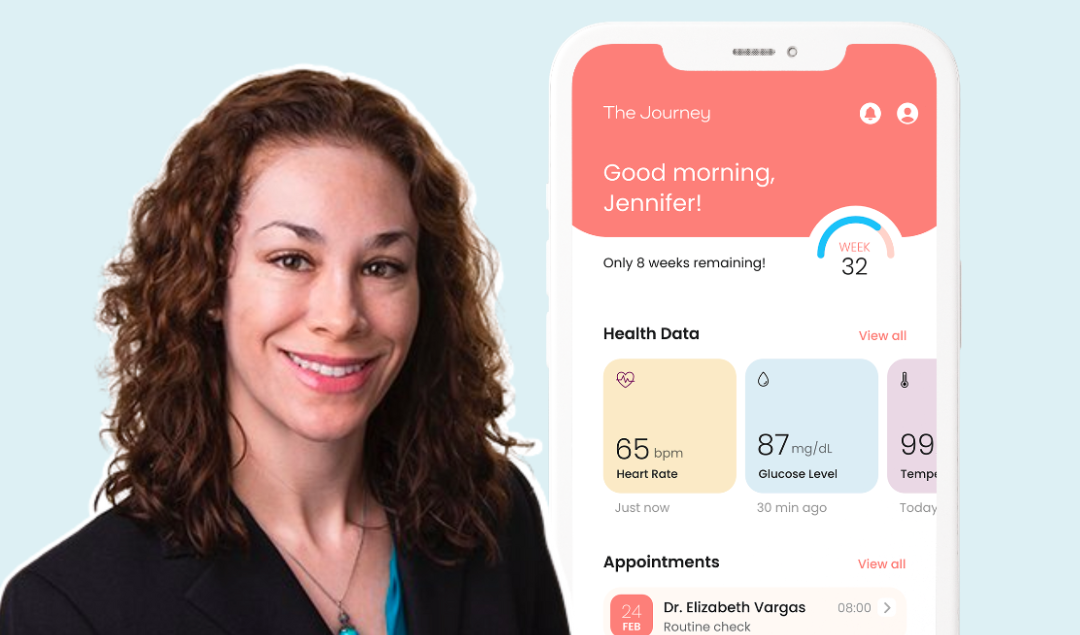The Pregnancy App Supporting Communities Of Color With Data And A Human Touch

The United States is the most dangerous and expensive high-income country for childbirth, especially for Black and Indigenous women.
Drawing on her own pregnancy experiences, Emagine Solutions Technology co-founder and CEO Courtney Williams has developed The Journey Pregnancy app. This data-driven tool couples the power of technology with a human touch to ensure a safer and more informed pregnancy journey.
Addressing Disparities in Maternal Healthcare
Black women face a nine times higher risk of maternal death compared to their white counterparts, and it is not because of differences in wealth. Earlier this year, a landmark study revealed that even the wealthiest Black mothers and their babies are twice as likely to die as their white counterparts.
Courtney Williams, a biracial woman, became acutely aware of the disparities in maternal healthcare after her sister’s challenging pregnancy experience. Motivated by the need to address this issue, Williams left her corporate job and founded Emagine in 2017 which uses remote patient monitoring for pregnancy care to improve outcomes.
Recently, Williams received additional backing through Pharrell Williams’ Black Ambition Prize and the U.S. Department of Health and Human Services (HHS) Office on Women’s Health Hypertension Innovator Award.
The Birth of The Journey Pregnancy App
Williams’ own pregnancy during the COVID-19 pandemic further drove her determination to address gaps in maternal healthcare.
“I came home from the hospital and quickly developed a blinding headache that wouldn’t go away,” Williams wrote for Fast Company. “Then came chest pain and increasing shortness of breath. Eventually, my legs got so swollen that there was a visible fluid line right below my knee, and it hurt to put on shoes or flip flops.”
“We didn’t know it at the time, but I had developed preeclampsia—a serious condition that accounts for tens of thousands of maternal deaths around the world each year.”
However, Williams struggled to access timely care in the thinly stretched healthcare system. She didn’t want to return to the hospital and risk getting exposed to COVID-19, but she was also aware of the racial disparities in maternal and infant health.
“I didn’t want to become a statistic,” she explained. “But I’m also someone who believes in the transformative power of technology and I couldn’t understand why there was not a remote solution for patients in this kind of situation. It’s why we created The Journey Pregnancy app.”
Helping patients advocate for themselves
While researching existing pregnancy apps, Williams discovered that many focused on fetal health but lacked features to empower pregnant individuals to manage their own health and navigate maternal care complexities.
“All mothers need this support along their pregnancy journey. But for people of color, the lack of this support creates a stark and deadly imbalance,” Williams continued.
“I’m biracial and, on my mom’s side of the family—my white side—going back three generations and one hundred years, there was only one instance where a pregnant mother had a risk and there was a negative outcome for the baby.”
“Going back the same number of generations on my dad’s side—my Black side—I can count on two hands the multiple late-term pregnancy losses, stillbirths, cases of preeclampsia, and hypertension in pregnancy.”

The Journey Pregnancy App addresses this gap by allowing users to track daily vitals and symptoms. This data empowers users to advocate for themselves during discussions with healthcare providers, and 40% of app users report feeling safer in their pregnancies.
Paid subscribers can also access virtual certified pregnancy wellness coaches who provide support in mental and physical health, nutrition, exercise, and emotional well-being throughout the pregnancy and postpartum period. These personal connections foster trust, ensuring that mothers feel heard and empowered to advocate for themselves.



